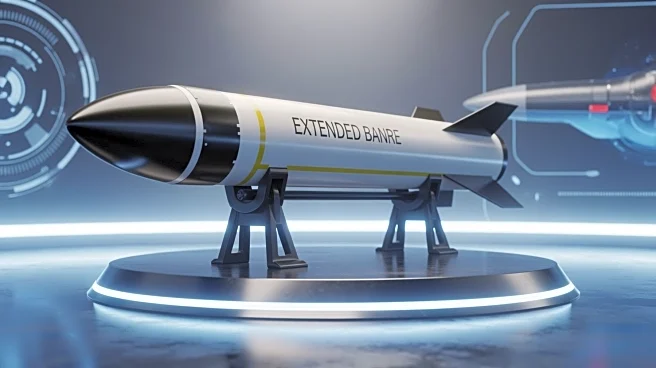What's Happening?
Israel Aerospace Industries (IAI) has introduced the Alpha version of its Laser-Homing Anti-Tank (LAHAT) missile, which boasts a range of up to 20 kilometers, doubling the range of its standard predecessor. The LAHAT Alpha is designed to meet market demand
for a low-cost precision weapon that can be launched from beyond line of sight, using an airborne or ground-based laser designator. This new missile is 2 meters long, weighs 25 kilograms, and is available with large anti-tank or fragmentation warheads. The development of LAHAT Alpha aims to enhance the effectiveness and lethality of the missile, addressing global demand for powerful and competitively priced missiles.
Why It's Important?
The introduction of the LAHAT Alpha missile is significant for military operations, particularly in urban and asymmetric environments where longer-range effects are crucial. The missile's ability to be launched from various platforms, including air, land, and sea, provides flexibility and strategic advantage. Its precision targeting capabilities and resistance to GPS jamming make it a reliable option for modern armies. The missile's extended range and competitive pricing could influence military procurement decisions and impact defense strategies globally, especially in regions facing security challenges.
What's Next?
The LAHAT Alpha missile is expected to attract interest from international defense markets, potentially leading to new export deals. As military forces seek advanced weaponry to enhance their capabilities, the missile's features may prompt further development and innovation in missile technology. Stakeholders, including defense contractors and military strategists, will likely monitor the missile's performance and integration into existing systems. Future developments may include additional variants or enhancements to meet evolving military needs.
Beyond the Headlines
The development of the LAHAT Alpha missile highlights the ongoing evolution of military technology, emphasizing precision and adaptability in combat scenarios. Ethical considerations may arise regarding the use of advanced weaponry in conflict zones, particularly concerning civilian safety and collateral damage. The missile's capabilities could also influence geopolitical dynamics, as countries assess their defense strategies and alliances in response to emerging threats.
















